Bennett Clark was Wolverhampton's best known local photographer.
His studio, operated by himself and then, under his name, by W. E. Hart,
was active for more than 60 years, from the end of the nineteenth
century to the 1960s. In these years the studio produced tens of
thousands of photographs. These ranged from studio work, to
postcards, to commercial work: any subject, it seems, was grist for
Bennett Clark's mill. He seems to have enjoyed a high reputation
and his photos are certainly of a high technical quality.
Many details of Bennett Clark's life and of his studios are missing.
All and any further information would be gratefully received. The
first purpose of this article is to make available a cache of documents
which I acquired from a local dealer. These documents came from
the estate of W. E. Hart but all further details are lacking.
Again, all and any further information would be gratefully received.
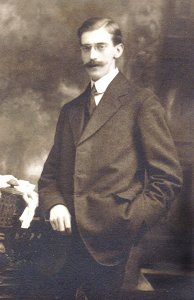 |
In the cache is this photo of Bennett Clark.
It is a part of the photo, also in the cache and shown below, of
Clark and his wife. It seems to be a studio shot with a
painted backdrop. It may have been a self-timed photo or
it may have been taken by an assistant - or even by another
local studio. |
| Bennett Clark had his studios at 74 Darlington Street and that
seems to have been their only address throughout their history. There were several other studios in that street and even Oscar Rejlander had been not far away. This reverse of a carte
de visite shows the address - and also a typical late Victorian
"artistic" design. |
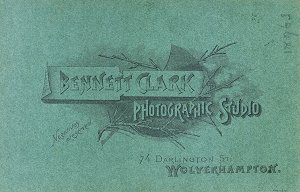 |
It seems that Clark owned the premises, though it is
possible that he had a lease of them. Either way they represent a
considerable commitment, which suggests that he must have established
himself in some way before opening at Darlington Street. I do not
know when he set up here but it must have been right at the beginning of
the 20th century.
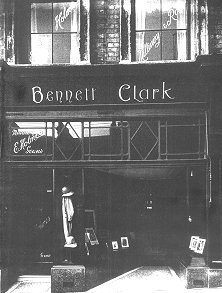 |
This is Clark's shop at 74 Darlington Street. To the left is the entrance to Edith Holmes' gowns shop, whose
premises can be seen on the first floor.
A photo in the City Archives, undated but apparently from the
1930s, shows the ground floor here occupied by the Dairy Tea
Room. Edith Holmes has gone and Bennett Clark is occupying
the side entrance with its display case and the upper floor. When this move took place is not known but it may be that Clark
was increasingly occupied with commercial work and a shop front
was simply not needed or economically sensible. The move
is not likely to represent a fall off in trade and
profitability. |
| This advert has neither date nor provenance. If it was in a trade journal it may not be significant that Clark
describes himself only as a commercial photographer. But it
does seem that he moved very much in that direction. |
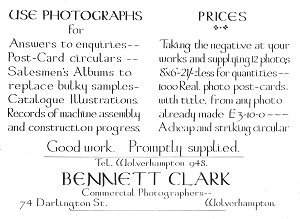
|
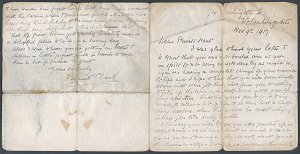 |
Certainly Bennett Clark was well established by the
time the first world war broke out and already had an assistant,
William Edward Hart. Hart was called up and the cache of
documents contains a letter from Clark to Hart when Hart was in the
Army in 1917. The front and back pages are shown here to the
left |
| The inside pages are shown to the left. It is reproduced
here in full because of what it tells us about Clark's business,
about how the war affected Wolverhampton life and because of the
indications it gives of the character of Clark himself. (Clark's
punctuation is little idiosyncratic and is reproduced here as
accurately as possible). |
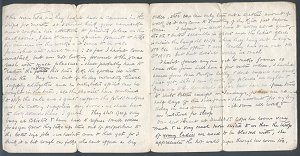 |
74 Darlington St
Wolverhampton
Nov 9th 1917
Dear Private Hart
I was glad to have your letter & to know that you are not
bowled over as yet in spite of not being so well done by as
might be, - you are having a complete change of your manner of
life and I hope to hear that you will soon shake down into some
job that will find you something to fill up the time and make
some good use of your abilities That’s the worst part of it to
my mind, to collar a lot of men & do their best to make them
useless when they would be better staying in their jobs till
really wanted.
I daresay you wife keeps you well posted up in local news -
we have about as much to do at 74 as we can manage - they all
ask about you at the various works - I was up at Sunbeam this
week & the men told me they hadn't had a camera in the shops for
months so I should think your namesake must confine his
attention to printing plans in the darkroom. I had to carry a
special permit to take the camera in the works - it seems to be
well furnished with naval men: so far I haven't come unstuck but
am not looking forward to the Xmas rush with much pleasure -
shall probably have to "ration" the customers this time like the
grocers do with their tea They have cut off the dry mounting
tissue supply altogether and no methylated spirits can be bought
in the town, all the chemists have combined to stop the sale and
I quite expect the plate makers will be cutting supplies very
soon - we shall have to look round then I guess. They still keep
very busy at Bristol & I have had to refuse small orders for as
you know they take up time out of proportion to the better size
jobs - we haven't come to that yet for I think it a bit rough on
folks who cant afford a big order, still one can only turn out a
certain amount of stuff so it may come to something of the kind
just before Xmas. I expect you don’t have to worry about grub -
the tea and butter scramble is great and the latest queue is
outside the lamp oil shops where they hang out a sign NO OIL
rather often & now Conolly has one out NO SPIRITS but that
doesn't worry us much
I haven't found any one yet to make frames so some other firm
will have a few extra orders, I haven't heard from Parker lately
& don’t expect her back just yet, still I know I can knock off p
cards all right - keep up to the demands so far but have no
spare time to write letters except on Sundays, for there are no
half days off this side Xmas - this accounts for my long delay
in answering yours - it seems all work & an interval for sleep
Our new tenant at Darlt. St. likes her rooms very much & is
very much mores suited to us than the troop of young ladies
we used to be blessed with, she appreciates the hot water pipe
through her room too, & has made her front room look very nice
indeed with the cream walls & polished floor - the sun has been
very kind lately & we had some topping weather very different to
this time last year That top front room gets fairly roasting and
is a delightful place to be on a sunny day
Well I hope to hear you are getting on better & enclose a
little paper which is easier to send than a bit of bacca or grub
Yours sincerely,
Bennett Clark |
 |
The signature on the letter. Bennett Clark
seems always to have identified his photos, with a print or an
impression of his name. These are usually in script, as at the
head of this article, but they are not a facsimile of this
signature. |
This letter contains a number of allusions which are now
unclear. Presumably Parker was a lady assistant. The new tenant
upstairs was, presumably, Edith Holmes. But who were the troops of
young ladies? A secretarial college is a possibility. The
reference to Bristol is tantalising but at least it is clear that Clark
is well established in the production of postcards and is well into
commercial photography, as he has clearly had a long connection with
Sunbeam.
Here are the other documents from the cache. All
help with identification would be much appreciated.
| This is the photo, badly creased across the middle, from which
the photo of Clark shown above has clearly been taken. And
presumably that is Clark's wife. |
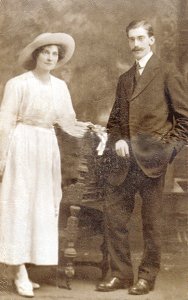 |
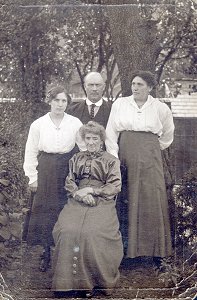 |
Although this photo was in the cache of documents from Hart's
estate, everything in it is said to be from Bennett Clark. It is
therefore possible that this is a photo of Clark's family. Or at
least, if the lady to the right is Mrs. Clark - and so far as one can
tell there is a similarity between her and his wife as shown in the
photo above - it may be of her family. |
| Likewise this house must be significant. Hart lived in North
Street, so it does not seem to be his. On the other hand this
house and garden look somewhat uncared for and Clark seems to have been
a meticulous person. |
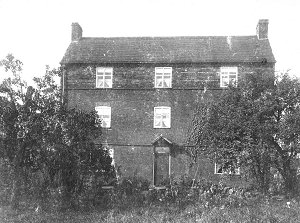 |
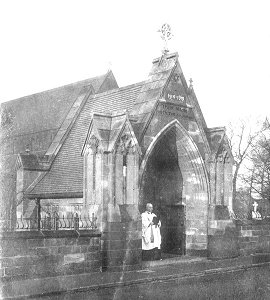 |
Holy Trinity Church and the Lich Gate at Heath Town. The plaques
form part of a war memorial. |
| The following information has kindly been sent by
David Randall Arthur Bennett Clark was born in 1863 at
Horfield, Bristol, Avon. His parents were William Clark (born in
Maisemore, Gloucestershire), also a photographer (1834-1903), and
Emma Maria Thomas (1840-1889).
In the 1871 census William Clark is listed as a photographer
living at 27 Park Street, Bristol. At the time William was 36, and
Emma 30. They had three children: a daughter, Amy, 8 years old, and
two sons, Arthur Bennett, 7 years old, and William, 4 years old.
They also had two servants.
In the 1881 census they are still living at the same address, and
have a second daughter Eleanor. Amy, now 18 years old is assisting
her father in his photographic business, as presumably is Arthur
Bennett, who is listed as a photographer. William and Eleanor are
both at school.
By 1888 Arthur Bennett Clark had moved to Wolverhampton. He is
listed in the 1888 Kelly's Directory as a photographer at 74
Darlington Street, his premises for the rest of his working life. It
seems that in the early days he also lived at the same address,
which is given in the 1891 census. At the time he had one servant,
Fanny Bill, aged 16.
At the age of 26, Arthur Bennett Clark
married Agnes
Cumberland (b.1865). They were married on 15th February, 1890 at St.
Peter's Church, Harborne.
In the 1896 Wolverhampton Red Book he is
listed as living at Eva Cottage, Stubbs Lane, Wolverhampton. by 1900
the family had moved. They are listed in Kelly's Directory as living
at Ivydene, Eagle Street, Penn Fields, Wolverhampton, where
they lived until at least 1937. In the 1901 census they are listed
as having two daughters, and one servant, Alice Cheadle, age 15.
Their daughters were Mabel Agnes, who would have been 9 years old in
1901, and Violet Margery who would have been 2.
Arthur Bennett Clark died on 11th November, 1937 at the Connaught
Nursing Home, Connaught Rd, Wolverhampton. In his will he left
£8,885 to his widow, Agnes Clark, and Arthur Thomas Vernon, a
manufacturer. |
|
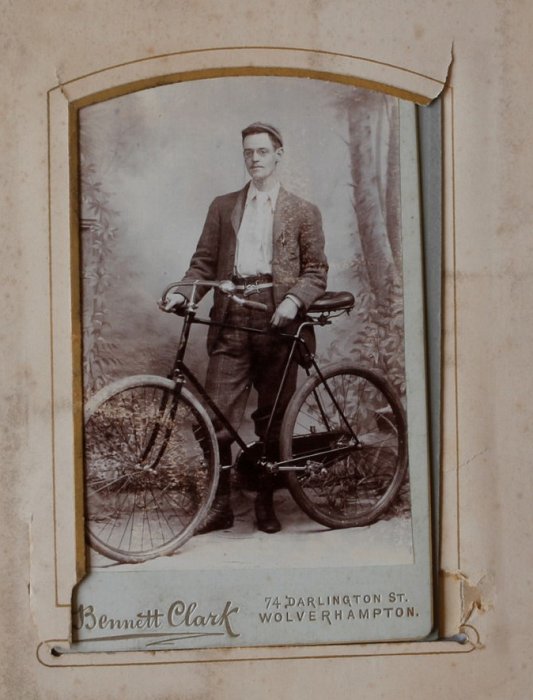
Courtesy of Elizabeth
Bowsher. |
A photo of Elizabeth
Bowsher's great great uncle,
Thomas Henry Jenkins. |
 |
|
 |
Return to
the
previous page |
|
Proceed to
the next page |
|

